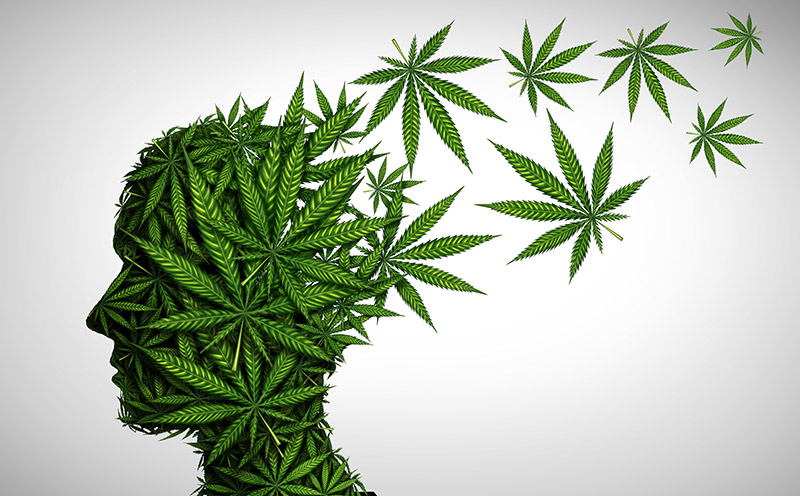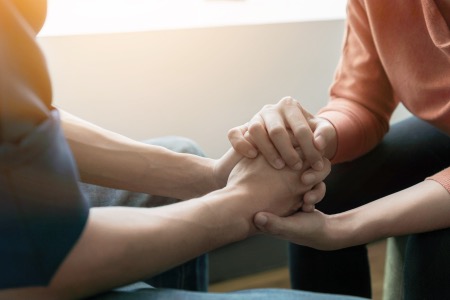Cannabis Rehab & Treatment
Because cannabis is so widely accepted across the world, detecting addiction can be difficult but when you understand the signs of cannabis addiction, you can find the help that you need. In our guide to cannabis addiction, we discuss treatment options including rehabilitation.
Understanding Cannabis Addiction
Cannabis also known as grass, weed, pot, and hash is a plant that consist of cannabinoids, tetrahydrocannabinol (THC) and cannabidiol (CBD). THC is the psychoactive cannabinoid in cannabis responsible for a “high” sensation while CBD is primarily used in alternative medicine. It is also a class B drug in the UK.
Cannabis or weed, is smoked in a joint, prepared in an oil form, or vaped. Cannabis has always had a reputation as a “natural drug” promoting relaxation and happiness, but the truth of the situation is that cannabis use can lead to dependence. Another factor that must be considered in cannabis use is modern plant cultivations. Today’s cannabis cultivations contain a higher percentage of THC resulting in faster levels of intoxication, and for some, the worsening of psychological conditions such as schizophrenia.
The regular use of cannabis will create tolerance over time. Tolerance develops when you have to consume larger doses of a substance to achieve the same effect.
Cannabis is often used to cope with stress, anxiety, and depression. It is also used recreationally in social situations. Cannabis containing THC has a psychoactive and relaxing effect on the mind and body. When cannabis is not ingested, cravings may develop, and symptoms may worsen over time.

Is Treatment for Cannabis Addiction Necessary?
Because cannabis is glamorised in pop culture it is considered less harmful or addictive than other types of drugs. This is an unfortunate misconception.
Under the influence of THC, individuals can suffer accidents as perception is distorted. Cannabis can also raise blood pressure and increase the risk of heart attack and stroke. Addiction will continue to preoccupy individuals until treatment is sought.
Treat the Addiction, not the Cannabis!
Cannabis addiction can be difficult to understand. People often blame the substance itself as being responsible for addictive symptoms and will encourage the individuals using cannabis to simply stop and all their problems will go away.
Unfortunately, as with any drug addiction, it is not the drug itself that is responsible for the addiction. Individuals who stop using cannabis may simply move onto another addiction, referred to as cross-addictions, and the vicious cycle continue. Without the necessary therapy an individual can relapse.
Research shows that cannabis users who smoke daily for over a decade have relapsed more than 6 times upon entering rehabilitation programmes (MentalHelp.netre). Post-treatment abstinence has also been reported at less than 15%.

The Health Benefits of Quitting Weed
Quitting weed provides mental clarity, sustained focus, and improved physical health. Cannabis is commonly associated with heart and lung problems similar to that of a chronic tobacco smoker (Hazelden Betty Ford Foundationme).
By stopping the ingestion of cannabis, physical improvements include:
- Increased energy
- Improved fertility
- Stable heart rate and blood pressure
- Stronger immune system
- Lower risk of lung infections and chronic coughs.
- Ability to think clearly/maintain focus
- Improved problem solving
- Mood stability
- Improved memory recollection and decision making.
Enter your phone number below and one of our qualified addiction specialists will get in touch to discuss your options.
Don’t be Afraid to Admit You Have a Problem!
Many believe that simply by quitting the use of a substance, the problems experienced by the user will simply go away. Addiction goes much further than simply the drug itself. Addiction to substances can involve a family history of substance abuse or mental health difficulties.
There is also a fear that the stigma of seeking treatment for a drug addiction will be disclosed in the workplace and negatively impact career opportunities.
Treatment for cannabis addiction is highly confidential. People from all walks of life can struggle with substance dependence and require help to overcome its negative impact on social, personal, and professional life. If you are battling addiction, realising you have a problem and the desire to find help now, can prevent the risks and complications from occurring later. The first step in the recovery process is admitting that a problem exists.
Choosing a Treatment Option
Making the brave step towards recovery opens a world of opportunities. It starts with choosing a treatment option to support the nature of a cannabis addiction and ensure that your individual needs are met. We look at the following rehab services for a cannabis addiction.

Private Rehab
A residential rehab programme is performed within a private treatment centre. Individuals with a cannabis addiction are required to remain at the facility for the duration of treatment. During this time, counselling services are provided by a qualified therapist, group supported activities encouraged, and learning to cope without dependence are explored.
How does Private Rehab Work?
Today’s private rehabilitation programmes are designed to provide a comfortable, inviting, and confidential environment for all those in recovery. A private rehab aims to minimise distractions and to keep you focused on the process of therapy and rehabilitation.
When you enter into a private programme, you will first undergo a cannabis detox. The purpose is to remove the substance from the body and then to proceed with supportive mental healthcare.
Once a detox is completed, withdrawal symptoms will start days after the substance is reduced and removed from the brain and body. As cannabis interacts with the brain’s cannabinoid receptors, it creates chemical changes and THC dependence.
When THC ingestion is reduced, the brain and body must readjust to the absence of the substance. This leads to intense cravings and the experience of withdrawal.
Fortunately, private rehabilitation provides the support and tools you need to overcome pressing symptoms of withdrawal (Rehabs.com). In private rehabilitation you receive support from clinical support staff, receive scheduled counselling, and be assisted with cravings and withdrawal symptoms.
Inpatient treatment provides access to professional counselling. It adopts a structured, educational approach and is considered the best way to identify and avoid the triggers of addiction. During therapy, you will be introduced to the tools to adjust to a “normal” or drug-free way of life. Aftercare is provided upon the end of the programme through outpatient services. It is independent of inpatient therapy but plays a vital part in minimizing relapse.
Therapy is also support available for families. Loved ones who are resentful of addiction or angry at the user for the choices made can receive family support. It focuses on educating families on patterns of addiction, how to cope, and how to assist those struggling with cannabis dependence.
Choosing a Rehab Centre
Choosing a rehab centre as part of your recovery can be difficult if you are not familiar with the services and which of these will best suit your needs. Rehab centres differ according to the programme structure and its practices.
If you are struggling to find a rehab and recovery centre, the CQC provides a guideline for each centre in the UK. Facilities are rated from the quality of service to the types of programmes it offers. You should also consider the therapeutic models used by the facility.

The traditional 12 step programme introduced by Alcoholics Anonymous focuses on a spiritual or religious foundation to guide individuals to recovery. Less traditional programmes such as the non-12 step mode encourages self-empowerment and accountability. Other types of rehab facilities specialise in treating addiction & mental health problems (known as dual diagnosis).
For those battling addiction and psychological condition such as depression and anxiety, a recovery centre offering counselling for mental health should be sought.
If you are searching for a treatment centre you can trust, we encourage you to give us a call. Our team of professionals can help you find the right rehab and recovery facility based on your unique requirements.
The Benefits of Private Rehab
- Highly individualised therapy from a licensed therapist
- Private time away from personal distractions to focus on your recovery
- A holistic approach to healing with awareness and education including the importance of a balanced lifestyle
- Aftercare treatment by supportive staff.

Private Counselling
Private counselling for addiction is an outpatient service. Much like you would visit a mental health practitioner for stress management or treatment of depression, addictions can be assisted with the expertise and support of visiting a private therapist.
While maintaining your daily lifestyle, you will schedule appointments with your therapist and visit them for counselling sessions a few times weekly.
The Benefits of Private Counselling
- Flexibility to choose the duration and schedule times for therapy
- An investment into the therapeutic treatment programme
- One-on-one sessions with an experienced and a certified therapist.
Paying for Treatment
Private counselling is paid for on a per session basis. For an outpatient service private counselling can cost between £120-£180 per session (My Online Therapy).
Private counselling is a convenient and a flexible alternative for drug rehab and recovery patients. While it does not provide the removal from distractions in one’s daily environment as with an inpatient programme, it provides the individual support that is fully tailored to address the nature of your addiction.
An inpatient programme for addictions may be covered by an insurance provider, but this must be negotiated with the insurer. When entering into a rehab programme, clients are required to pay a deposit. The remaining balance can be settled in instalments until the balance is paid in full by the end of the treatment. Residential rehab can cost £3000-£4000 per week.

Free Outpatient Services
Free Outpatient services are provided by charitable organisations in the UK including the NHS. While numerous organisations are available to treat a cannabis or substance addiction, most individuals will be placed on a waiting list prior to entry. There is also less likelihood of individualised counselling because there are more patients to treat per therapist.
Advice on Quitting Cannabis
Quitting cannabis addiction can be a difficult road ahead but an achievable one too. We can help you take the steps to managing a substance dependence when you are ready to make the decision in your best interests.
Take your recovery seriously
The success of your recovery will depend on your attitude for change. While relapse does not mean a failure in your recovery journey, steps must be taken to invest in the programme and to motivate yourself for positive, lasting change that you can achieve.
Remove bongs, rolling materials and grinders from the home
All cannabis paraphernalia must be removed from the home prior to the completion of an inpatient programme or during an outpatient recovery. The purpose is to prevent individuals from being tempted upon returning from treatment.
Find a new focus
By focusing on new things in your life whether a new diet or new exercise and hobby, you can improve your physical and your mental well-being. It is also a great way to feel more confident about yourself. By finding something positive to focus on you can realign your motivation and your goal attainment.
Support Groups are Useful
Support Groups such as narcotics Anonymous, marijuana Anonymous and SMART have become incredibly important in individual recovery and relapse prevention. These groups offer immense support by allowing individuals to share experiences and relatable stories. It offers a true sense of support and relatability when working on the rehabilitation process.
